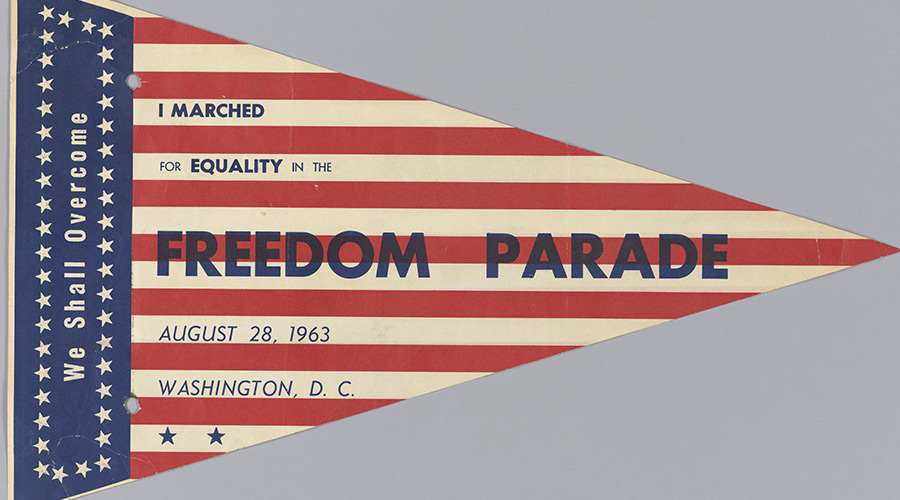On August 28, 1963, a historic event in the fight for racial parity took place — the March on Washington for Jobs and Freedom. 60 years later, the fight to end racial, economic and social inequities continues, and thousands gathered on the National Mall to mark the 60th anniversary of the event last year.
Ahead, we discuss the 1963 March on Washington for Jobs and Freedom, the 60th anniversary event and Robert F. Smith’s connection to both of these monumental days.
The 1963 March on Washington for Jobs and Freedom
The 1963 March on Washington for Jobs and Freedom was the vision of Civil Rights Movement leaders A. Philip Randolph, Bayard Rustin and Reverend Dr. Martin Luther King, Jr. In addition, leaders such as future U.S. House Representative John Lewis of the Student Nonviolent Coordinating Committee (SNCC), James Farmer of the Congress of Racial Equality (CORE) and Roy Wilkins of the National Association for the Advancement of Colored People (NAACP) were on the march’s planning committee.
The date of the march was significant to the Civil Rights Movement for two reasons. 1963 was the centennial anniversary of the signing of the Emancipation Proclamation, and August 28, 1963 marked eight years since Emmett Till’s life was taken.
The march protested numerous injustices, including legalized racial segregation, and fought to protect the voting rights of disenfranchised communities. It also addressed unemployment, education inequities, the federal minimum wage and unfair employment practices. A primary goal of the march was to pressure Congress into passing the Civil Rights Act of 1964, which was signed into law about a year later. On the day of the march, nearly 250,000 people gathered at the National Mall in Washington, D.C., helping Randolph, Rustin, Dr. King and other Civil Rights leaders’ pursuit of equality.
During the event, several speakers, including Civil Rights leader and orator Dr. King, addressed the nation on the issues that Americans from disenfranchised communities faced. Dr. King spoke for 16 minutes in front of the Lincoln Memorial, presenting what would later be known as the “I Have a Dream” speech.
Randolph, during his speech stated, “We here today are only the first wave. When we leave, it will be to carry the Civil Rights revolution home with us into every nook and cranny of the land, and we shall return again and again to Washington in ever-growing numbers until total freedom is ours.”
Joined by several allies, including the Jewish community, Rabbi Joachim Prinz said that day, “The most important thing that I learned in my life is that bigotry and hatred are not the most urgent problems. The most urgent, the most disgraceful, the most shameful and the most tragic problem is silence.”
The 60th Anniversary of the March on Washington
On August 28, 2023, crowds gathered at the same location over half a century later to continue the dream, and fight, of Dr. King, Randolph and Rustin.
“The only way you break the cycle is to understand your history and talk about it,” said marcher Patricia Tyson, who was 15 years old at the 1963 March on Washington for Jobs and Freedom.
Several speakers took to the podium to reflect on the progress made as a nation and where we stand today. The speakers included:
- Martin Luther King III, the son of Dr. King and a human rights activist, and his daughter Yolanda King
- Reverend Al Sharpton, Founder and President of the National Action Network
- Andrew Young, former U.S. Ambassador to the United Nations
- Marc Morial, President and CEO of the National Urban League
- Jonathan Greenblatt, CEO and National Director of the Anti-Defamation League
- Kristen Clarke, Assistant Attorney General for Civil Rights
- Robert F. Smith, Founder, Chairman and CEO of Vista Equity Partners and founding director and President of Fund II Foundation
Robert F. Smith and the March on Washington
In 1963, understanding the importance of the march, Smith’s mother took an infant Smith and his brother with her on her drive from Colorado to Washington, D.C. to bear witness. During Smith’s speech at the 60th anniversary event, he discussed the work that still needs to be done in the U.S., stating now is the time to incorporate economic justice in the fight for equal rights for all. He referenced closing the racial wealth gap and the digital divide, investing in education and ensuring an equal distribution of public resources.
“Overcoming systemic oppression requires systemic investment. It takes more than a paycheck; it takes power and ownership. Prosperity for all will only come when we have equality of opportunity for all,” said Smith.
Watch Smith address the crowd at the 60th Anniversary of the March on Washington.
